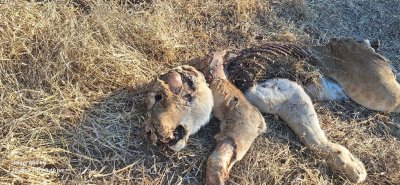News
Latest Lion Aid News
Lion poaching in Botswana
Tuesday 24th June 2025
|
A few days ago, we posted a blog on the effects of anthropogenic (human-mediated) mortality on Africa’s ever-decreasing wild lion populations. In that report we highlighted a growing threat – the direct poaching of lions for body parts used locally in African nations as “muthi” (traditional medicine) or smuggled abroad mainly to Viet Nam. We also mentioned that detection of lion carcasses is generally low (<20% in Mozambique). However, carcasses with missing body parts (heads, paws, skin etc) are increasingly discovered. Here, we show evidence that such targeted poaching is on the rise in Botswana. In the past, that country already had high rates of lion anthropogenic mortality, mainly due to Problem Animal Control, citizen retaliation for livestock depredation, and trophy hunting. In the past few weeks we have been made aware of directly poached carcasses close to the northern town of Maun. Four carcasses with paws, heads and pieces of skin removed were found near NG34, a community concession that uses land proximate to the Moremi Game Reserve within the Okavango Delta, a World Heritage Site. Also a man walking his dog discovered a plastic bag containing lion paws and a lion head just outside Maun, the “safari capital” of Botswana. Clearly, a market for such parts has been established, although ultimate destinations could lie outside Botswana. Use of traditional medicine derived from wildlife has long been established in the country. Investigations of these killings are at early stages, but we have little hope any suspects will be apprehended. Until such direct poaching of lions is properly addressed, appropriately investigated and markets scrutinised, further incidents will occur. As Botswana citizens are allowed to kill wildlife that takes crops and livestock, or even “threaten” to do so, the danger of existing and growing markets is obvious. LionAid stands ready to assist wildlife authorities and communities to report carcasses and discover the whereabouts of perpetrators and markets to prevent further growth of this source of lion mortality. Botswana cannot remain complacent about this growing trend – after all, wildlife tourism already contributes over 11% of GDP, is a major earner of foreign exchange, and provides considerable employment to people in rural communities. We will raise this issue when we visit the UK Parliament next week to discuss bringing in a ban on the import of lion trophies. Tags: lions, Botswana, poaching, muthi Categories: Traditional Medicine, Extinction, Illegal Wildlife Trade, Population declines |
Posted by Chris Macsween at 14:42
No comments have been posted yet.
Add a new comment
Existing user
New user sign up




